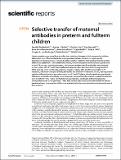Selective transfer of maternal antibodies in preterm and fullterm children
Author(s)
Dolatshahi, Sepideh; Butler, Audrey L; Pou, Christian; Henckel, Ewa; Bernhardsson, Anna Karin; Gustafsson, Anna; Bohlin, Kajsa; Shin, Sally A; Lauffenburger, Douglas A; Brodin, Petter; Alter, Galit; ... Show more Show less
DownloadPublished version (2.102Mb)
Publisher with Creative Commons License
Publisher with Creative Commons License
Creative Commons Attribution
Terms of use
Metadata
Show full item recordAbstract
Preterm newborns are more likely to suffer from infectious diseases at birth compared to children delivered at term. Whether this is due to compromised cellular, humoral, or organ-specific development remains unclear. To begin to define whether maternal–fetal antibody transfer profiles differ across preterm (PT) and fullterm (FT) infants, the overall quantity and functional quality of an array of 24 vaccine-, endemic pathogen-, and common antigen-specific antibodies were assessed across a cohort of 11 PT and 12 term-delivered maternal:infant pairs from birth through week 12. While total IgG levels to influenza, pneumo, measles, rubella, EBV, and RSV were higher in FT newborns, selective Fc-receptor binding antibodies was noted in PT newborns. In fact, near equivalent antibody-effector functions were observed across PT and FT infants, despite significant quantitative differences in transferred antibody levels. Moreover, temporal transfer analysis revealed the selective early transfer of FcRn, FcγR2, and FcγR3 binding antibodies, pointing to differential placental sieving mechanisms across gestation. These data point to selectivity in placental transfer at distinct gestational ages, to ensure that children are endowed with the most robust humoral immunity even if born preterm.
Date issued
2022Department
Massachusetts Institute of Technology. Department of Biological EngineeringJournal
Scientific Reports
Publisher
Springer Science and Business Media LLC
Citation
Dolatshahi, Sepideh, Butler, Audrey L, Pou, Christian, Henckel, Ewa, Bernhardsson, Anna Karin et al. 2022. "Selective transfer of maternal antibodies in preterm and fullterm children." Scientific Reports, 12 (1).
Version: Final published version